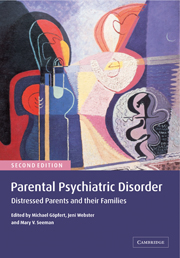Book contents
- Frontmatter
- Contents
- List of contributors
- Foreword
- Preface
- Part I Basic issues
- Part II Comprehensive assessment and treatment
- Part III Specific disorders: the impact on parent–child relationships
- 11 Schizophrenia and motherhood
- 12 When a parent suffers from an affective disorder: effect on the child
- 13 Alcohol and drug problems in parents: an overview of the impact on children and implications for practice
- 14 When mothers abuse drugs
- 15 Personality disorder in parents: developmental perspectives and intervention
- Part IV Specific treatments and service needs
- Part V Child-sensitive therapeutic interventions
- Part VI Models for collaborative services and staff training
- Afterword
- Index
- References
15 - Personality disorder in parents: developmental perspectives and intervention
from Part III - Specific disorders: the impact on parent–child relationships
Published online by Cambridge University Press: 09 August 2009
- Frontmatter
- Contents
- List of contributors
- Foreword
- Preface
- Part I Basic issues
- Part II Comprehensive assessment and treatment
- Part III Specific disorders: the impact on parent–child relationships
- 11 Schizophrenia and motherhood
- 12 When a parent suffers from an affective disorder: effect on the child
- 13 Alcohol and drug problems in parents: an overview of the impact on children and implications for practice
- 14 When mothers abuse drugs
- 15 Personality disorder in parents: developmental perspectives and intervention
- Part IV Specific treatments and service needs
- Part V Child-sensitive therapeutic interventions
- Part VI Models for collaborative services and staff training
- Afterword
- Index
- References
Summary
Introduction
Both personality disorder and parental inability to meet children's needs have their origins, at least in part, in the quality of early experiences. Where individuals engaged in the constellation of disruptive behaviours and interpersonal role and relationship difficulties associated with personality disorder also have child-care responsibilities, the implications for the well-being and safety of children will be considerable. For individuals with severe relationship difficulties who are, or become, parents, that key life transition will have profound implications for themselves as individuals, as partners and as parents. Personality disorder itself presents considerable diagnostic, risk management and therapeutic challenges for (mental) health, social care and criminal justice systems because of the diverse and competing needs of parents and children which challenge the existing separateness of the various adult and children's services.
This chapter will use two theoretical frameworks, attachment theory and role relationships, to examine the concept of personality disorder, and how/why personality disorder interferes with ‘good enough’ parenting. These frameworks will also be used to describe implications for assessment and therapeutic interventions. This includes use of alternative care provision for children within the public sector.
Background issues and definitions
Personality disorder (PD) is defined by DSM–IV (American Psychiatric Association, 1994) as: ‘Behaviours or traits that are characteristic of the person's recent and long-term functioning. The behaviours and traits must be sufficient to cause impairment of functioning or subjective distress.’
Keywords
- Type
- Chapter
- Information
- Parental Psychiatric DisorderDistressed Parents and their Families, pp. 217 - 238Publisher: Cambridge University PressPrint publication year: 2004
References
- 8
- Cited by

